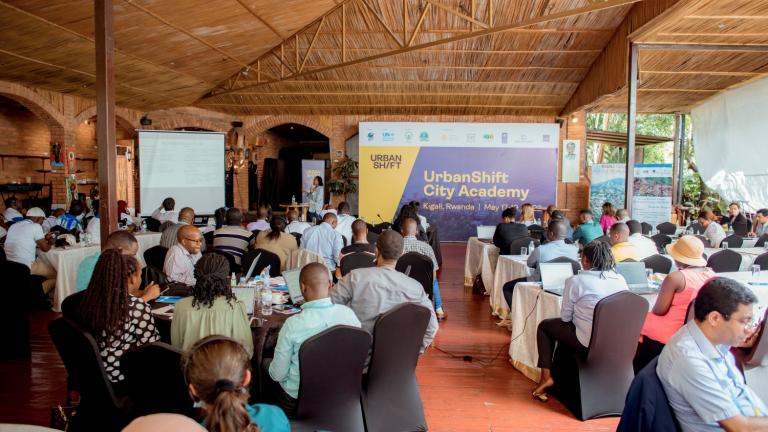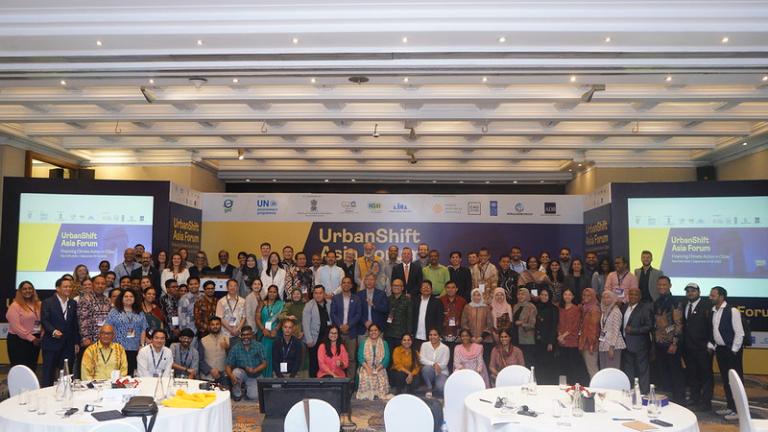Academy
Indonesia City Academy
Hosted for cities from Indonesia, India, and China, this City Academy will focus on Circular Economy, Nature-Based Solutions, and Integrated Climate Action Planning.
From August 27-29, 2024, UrbanShift hosted a city academy in Indonesia for GEF-7 cities in Indonesia, India and China. Co-hosted by Bappenas, the Ministry of National Development Planning in Indonesia, this three-day event focused on training global and regional experts on sustainable and integrated urban planning.
The Indonesian City Academy delivered the following three courses:
Circular Economy: Led by ICLEI – Local Governments for Sustainability, this training provided an overview of key circular economy concepts, and outlined how and where circular measures can be implemented in cities and urban planning. The circular economy offers cities a way to relinquish outdated economic systems – incompatible with current ecological and social contexts – and augment their economic outputs in a sustainable and equitable manner. The transition towards a circular economy promises greater energy & resource efficiency, sustainable economic growth, reduced emissions, and numerous benefits to biodiversity and human health, helping cities gain ground on their Sustainable Development Goals.
Nature-Based Solutions: Led by World Resources Institute, the Nature-Based Solutions (NbS) training explored how the power of NbS can be utilized in global South cities in Asia through an integrated urban development approach, to deliver benefits to city residents and the climate. NbS are known to provide benefits to people in terms of human health and well-being, for biodiversity and climate change mitigation, and for economic development, yet they are not being scaled at the pace needed for them to deliver transformative benefits in the timeframe needed to address the global climate and biodiversity crises. This training explored the major challenges that Asian cities are facing to implement NbS and opportunities that exist to start implementing NbS.
Integrated Climate Action Planning: Led by C40 Cities, this training provided a roadmap for cities to develop climate action plans and tackle climate change. The course started with evidence on [1] WHY there is an urgent need for cities to act now, in line with global commitments such as the Paris Agreement. It explored the different elements of [2] WHAT constitutes a science-based climate action plan. Based on the experience of several cities around the world, the course dove in on [3] HOW exactly a climate action plan is built, providing practical examples and recommendations. And it concluded with an overview of [4] WHO are the different stakeholders that an integrated climate action planning must convene to make sure that climate action is inclusive, equitable and impactful.

Introducing the UrbanShift Online City Academy: Eight Essential Courses for Sustainable Urban Planning
The UrbanShift Online City Academy offers free access to eight robust, self-paced courses for furthering understanding around key planning themes.

UrbanShift hosts first City Academy in Kigali, Rwanda
The three-day workshop brought together participants from 20 African cities to learn about and exchange ideas on climate action planning and nature-based solutions as tools to create greener, more resilient cities.

UrbanShift Asia Forum 2023: Transforming cities for a sustainable tomorrow
UrbanShift's first regional forum focused on the critical topic of financing sustainable urban transformations.

UrbanShift at COP30
UrbanShift will be participating in a range of events during the Local Leaders Forum in Rio and COP30 in Belém. Learn more here.

